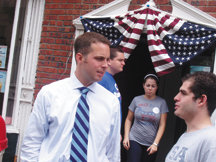Considering everything else that has happened to Peter Cammarano since his election as Hoboken mayor last June and his arrest and resignation a few weeks later, settling tens of thousands of dollars in campaign debt may not be high on his list of priorities.
But while Cammarano contemplates his upcoming August sentencing for pleading guilty to a federal extortion charge, several local merchants are wondering who is going to pay their bills. They allege that they have dealt with several thousands of dollars in bounced checks or other financial problems left from the 2009 campaign.
“Our whole future was invested in Peter.” – A business owner
________
Several former high-ranking officials from the campaign declined to comment on the subject, including the former campaign manager and finance director.
Cammarano’s defense attorney, Joseph Hayden of Roseland, also declined to comment.
But one Cammarano campaign insider who asked not to be named confirmed that some local business owners have large debts owed to them.
Cammarano’s team is also delinquent in filing their state financial reports with the Election Law Enforcement Commission (ELEC), so the total amount of debt and to whom the money is owed is not a matter of public record.
Some of the businesses declined to comment, but others were forthcoming about the unpaid bills.
Bounced checks
Mario Jimenez, owner of Big Banner Plaza, a strip mall at 401 Jackson St., is one of the affected merchants. He alleges that his check cashing business lost $30,000 to $35,000 due to campaign worker paychecks that bounced.
“I almost went out of business,” he said last week.
Jimenez said his lawyer tried to negotiate with Hayden, Cammarano’s attorney, to avoid litigation, but Jimenez said nothing came from it. He said he plans to file a lawsuit against the campaign.
His lawyer, Louis Zayas of North Bergen, would not comment on any potential litigation or negotiations.
“Unbelievable,” Jimenez said. “I want my money back. If it wasn’t for family and friends that lent me money, I would have gone out of business.”
Worker pay
An owner of a New Jersey-based political field operations firm that worked with Cammarano in the June runoff election said his business was left holding the bag for roughly $37,000, but asked that the firm’s name not appear in this story. The firm helped cut checks for street workers in Cammarano’s campaign.
The Cammarano campaign issued a $13,000 check so the firm could pay street workers, but the check bounced. So the firm’s owner used his personal bank account to cover $8,000 of the money they distributed to the workers.
“I wanted to pay the people,” the owner said. He was also charged $4,000 in bank fees for the bounced checks, he said.
The $8,000 covered some of the workers’ paychecks, but the other checks ended up bouncing. (Some were cashed by Jimenez at Big Banner Plaza.)
A wire transfer proffered by the campaign to the owner to reimburse his personal $8,000 loss also was not valid, the owner said. Other campaign insiders confirmed that this wire transfer – for some reason – did not go through even though a receipt was provided to the firm.
Although the firm’s contract with the campaign was only verbal, the owner alleges that Cammarano and his slate also stiffed him on a month’s pay ($5,000) and a bonus for winning the election ($10,000).
“Our whole future was invested in Peter. I lost like six months of my life,” the owner said. “It’s very hard to rebound from losing that kind of money, but I trusted him and the emotional loss was worse than the financial loss.”
Like Jimenez, the political operations firm owner credited family and friends for helping him move past the large financial loss. He is now exploring his options to recoup the money.
Bar tab
Bar owner Joe Branco was close to the campaign, and hosted one fundraiser and two election night celebrations at his bar, Room 84 (formerly Bar None) by City Hall.
The three parties totaled over $9,000, but no one has paid the bills.
Branco made other personal contributions to the campaign, and like many other supporters, he felt burned after Cammarano’s arrest. But this debt isn’t personal; it’s business.
“Nobody has a straight answer to say [how we should get paid],” Branco said. “Who is ultimately accountable? If I’m just going to wash [out the debt], I want someone to tell me that. I want closure.”
Between the May election and the June runoff last year, Branco submitted bills to the campaign but was told the money needed to be fundraised. So Branco held another party, but never recouped the money.
“Everybody’s playing the shell game,” he said. “Where does the buck stop?”
Recently, he asked Cammarano personally when he would be paid, but Branco said Cammarano told him, “You can’t get blood from a rock.”
Aside from these three businesses, a source close to the campaign confirmed that approximately $20,000 is owed to other miscellaneous vendors.
Getting paid
Joe Donohue, deputy director of ELEC, said his commission has no way of eliciting payment from campaigns in municipal elections.
“The only recourse is to sue,” he said.
But civil lawsuits can be costly for the business owners and even if they do sue, who exactly is held accountable for the debt, particularly if the candidate faces jail time? Is it the entire slate of candidates responsible? The treasurer?
Campaigns are structured like limited liability corporations, in that you cannot hold individuals accountable for the debts of the group. That is, unless you can prove fraud on the part of an individual, according to one attorney who asked that his name not appear in this story.
Timothy J. Carroll may be reached at tcarroll@hudsonreporter.com.
